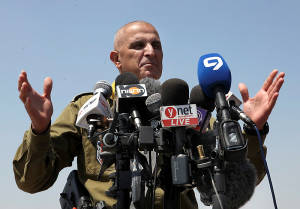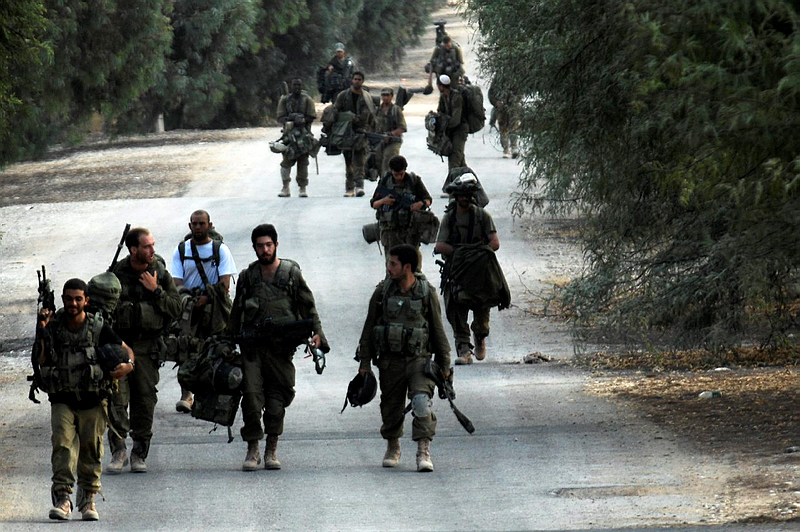“Wherever we operated, our troops were able to overcome and defeat the enemy, overpower it and neutralize its abilities.” – Maj. Gen. Sami Turgeman

Sami Turgeman, commander of the South Front Command, speaks during a press conference on Tuesday, saying the residents of southern Israel can now feel safe returning to their homes. (Photo: Gideon Markowicz//Flash90)
Twenty-nine days after Operation Protective Edge was launched and two and a half weeks after Israeli ground troops entered Gaza, the IDF declared Tuesday that it had successfully completed neutralizing the terror tunnels threatening southern Israeli communities.
“We have neutralized all the tunnels known to the IDF and we have undermined Hamas tunnel infrastructure,” GOC Southern Command Maj. Gen. Sami Turgeman said.
“Hamas spent tens of millions [of dollars] on its tunnel infrastructure and on other assets, and all of that has been destroyed. The operation has significantly damaged Hamas’ capabilities.”
According to Turgeman, “The operation was complex and involved urban warfare and underground fighting. We found entire buildings — entire streets — booby-trapped. We encountered anti-tank, mortar and sniper fire, and we engaged the enemy at very short range.
“Wherever we operated, our troops were able to overcome and defeat the enemy, overpower it and neutralize its abilities. IDF troops met their operational objectives successfully. Our soldiers deserve all praise. Israel can be proud of its soldiers, who demonstrated fighting spirit, as well as true heroism. I believe the public has also shown its strength, demonstrating mutual guarantees and the willingness to support the troops on the ground, which is truly commendable.
IDF Commanders and Soldiers Sacrificed their Lives
“This mission was accomplished thanks to the commanders and soldiers who sacrificed their lives for it. Our hearts go out to the bereaved families and we will continue to look after them. We also wish a speedy recovery to those who were wounded,” he concluded.
Military data indicates that between 750 and 1,000 terrorists were killed in the month-long Gaza campaign, and at least 253 of them were Hamas operatives.
Gaza terrorists fired 3,360 rockets at Israel, 584 of which were intercepted by Iron Dome. Some 115 projectiles hit populated areas in Israel, and 2,542 rockets exploded in open areas.
IDF Reservists Remain on Guard at Gaza Border
Combined, Israel’s air and ground forces launched 4,762 strikes against terrorist targets in Gaza.
Israel had withdrawn all of its forces from the Gaza Strip by 8 a.m. Tuesday, when the 72-hour cease-fire declared on Monday evening went into effect. As of now, the IDF will refrain from releasing the reservists that have been called up during the operation, in case fighting resumes, but many reservists have been relieved by new troops and have been given the chance return home for a few days.
The IDF has also redeployed many of its military vehicles and equipment along the Israeli side of the Gaza border, improving existing positions and taking up new positions in Gaza border area communities.
The IDF is also preparing for the possibility that Gaza terrorists will try to attack the Israeli communities adjacent to the border, or stage mass riots near the border, as they did at the end of 2012 Operation Pillar of Defense.
Defense officials said Tuesday that the military cannot assume that Hamas’ tunnel infrastructure has been rendered completely useless, but stressed that 32 terror tunnels — some known to Israeli intelligence ahead of the operation and some discovered during the fighting — have been destroyed.
Top Priority: Terror Tunnels
Over the next few days, the IDF will destroy several shafts that were recently discovered, a military source said, stressing that the shafts in question could be safely eliminated from the Israeli side of the border.
Should the cease-fire hold, the military is likely to begin investigating the various incidents that took place during Operation Protective Edge, including the use of non-armored vehicles along the Israeli side of the border despite the threats prevalent in the sector, the use of outdated armored personnel carriers, and the infiltration attacks near the kibbutzim of Nir Am and Nahal Oz.
One of the top priorities for the military is likely to be dealing with the issue of terror tunnels and exploring what can be done to further negate this threat in the future.
Meanwhile, cease-fire talks continued in Cairo on Wednesday. Israel sent officials to join the Cairo talks to cement a longer-term deal during the course of the current 72-hour truce that began on Tuesday morning. Hamas and Islamic Jihad have also dispatched representatives from Gaza.
US Secretary Kerry Talks of Wider Peace Efforts in Cairo
U.S. Secretary of State John Kerry, echoing Israel’s position, linked on Wednesday a lifting of blockades on Gaza to Hamas giving up its rocket arsenal.
“What we want to do is support the Palestinians and their desire to improve their lives and to be able to open crossings and get food in and reconstruct and have greater freedom,” Kerry said on the BBC’s HARDtalk program.
“But that has to come with a greater responsibility towards Israel, which means giving up rockets, moving into a different plane.”
Kerry said all this would “finally come together” as part of wider Israeli-Palestinian peace efforts that he has spearheaded but which have been frozen since April when Palestinian Authority President Mahmoud Abbas struck a unity deal with Hamas.
Israel’s Diplomatic-Security Cabinet met late on Tuesday to discuss the aftermath of the fighting in Gaza and strategy for the Cairo negotiations.
An Israeli official, who declined to be identified, said Israel wanted humanitarian aid to flow to Gaza as soon as possible.
Israel Demands Demilitarization, Hamas Refuses
But, the official said, the import of cement — vital for reconstruction — would depend on achieving guarantees that it would not be used by terrorists to construct more infiltration tunnels leading into Israel and other fortifications.
The Palestinians are demanding an end to the Israeli-Egyptian blockade on Gaza and the release of prisoners, including those Israel arrested during Operation Brother’s Keeper in Judea and Samaria in June.
Israel has resisted these demands.
“For Israel the most important issue is the issue of demilitarization. We must prevent Hamas from rearming, we must demilitarize the Gaza Strip,” Netanyahu spokesman Mark Regev told Reuters television.
Hamas, which controls the Gaza Strip, has ruled out giving up its weapons.
Egypt has positioned itself as a mediator in recent Gaza conflicts but, like Israel, its current administration views Hamas as a security threat.
This article was published in Israel Hayom.
Do You Love Israel? Make a Donation - Show Your Support!
Donate to vital charities that help protect Israeli citizens and inspire millions around the world to support Israel too!
Now more than ever, Israel needs your help to fight and win the war -- including on the battlefield of public opinion.
Antisemitism, anti-Israel bias and boycotts are out of control. Israel's enemies are inciting terror and violence against innocent Israelis and Jews around the world. Help us fight back!
